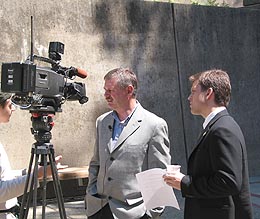|
June 14, 2004
State Department program brings delegation of
scientists from former Soviet Union to UCSC
By Tim Stephens
A delegation of scientists from the former Soviet Union working through
the U.S. State Department's BioIndustry Initiative visited UCSC last
week for an all-day program that included research presentations, laboratory
tours, and informal discussions. The visit could lead to new collaborative
research projects involving UCSC faculty and scientists from the countries
of the former Soviet Union.
|

A local television crew interviews Professor Vsevolod I. Kiselev,
deputy director of the Center for Molecular Diagnostics and Therapy
in Moscow (left), and UCSC alumnus Jason Rao, director of the
U.S. State Department's BioIndustry Initiative (right), during
their visit to campus as part of a delegation of Russian scientists.
Photo by Tim Stephens
|
The BioIndustry Initiative (BII) was created after the terrorist attacks
of September 11, 2001, to strengthen U.S.-Russian cooperation in combating
the threat of bioterrorism.
The BII sponsored more than 100 leading scientists and biotechnology
industry representatives from Russia, Ukraine, and Uzbekistan to participate
in the Biotechnology Industry Organization's annual conference, BIO
2004, held in San Francisco last week.
After the conference, most of the delegation then came to UCSC, where
they were hosted by the Department of Chemistry and Biochemistry.
BII director Jason Rao earned his bachelor's degree in synthetic organic
chemistry at UCSC and worked in the laboratory of Bakthan Singaram,
professor of chemistry and biochemistry. Rao later earned a Ph.D. at
Johns Hopkins School of Medicine and worked at the National Institutes
of Health before joining the State Department's Office of Proliferation
Threat Reduction.
Rao said his connections with the campus weren't the only reason he
wanted to bring the delegation to UCSC. "This is a fertile ground
for research, and there is a lot of opportunity here," he said.
Joseph Konopelski, professor and chair of chemistry and biochemistry,
said the day's events engendered a lot of interest in potential collaborations
between UCSC faculty and the visiting scientists. Konopelski said that
after seeing how good the interactions were during lunch, he rearranged
the afternoon schedule to allow more time for informal discussions.
"There's no question that there is incredible scientific talent
in the countries of the former Soviet Union. What they are hungry for
now are interactions with other scientists and opportunities that their
own economies just can't provide," he said.
The mission of BII is to counter the threat of bioterrorism through
targeted transformation of former Soviet biological research and production
capacities. Rao said this unique international program has "incredible
potential," both in joint efforts to combat terrorism and in opening
up significant opportunities for U.S. industry.
"We are tapping into one of the greatest scientific communities
during a time of enormous growth and opportunity. The possibilities
are endless," he said.
The program at UCSC included presentations by both UCSC faculty and
visiting Russian scientists working in various areas of biomedical research.
Among the UCSC presenters was Anthony Fink, professor of chemistry and
biochemistry, who has collaborated with Russian scientists in some of
his research on the role of protein aggregation in diseases such as
Parkinson's and Alzheimer's.
"It looks like we may start a new collaboration based on the discussions
we had with some of the scientists in the delegation," Fink said.
Among the distinguished Russian scientists who presented their work
was Raisa Martyniuk, a deputy director general for R&D at the State
Research Institute of Virology and Biotechnology (VECTOR). A major goal
of VECTOR is to fight emerging infections, Martyniuk said.
"The only way to do this is through collaboration," she said.
"We are working for the long term because there are many emerging
and newer problems, such as SARS and Avian flu. We want to develop a
new generation of antivirus drugs, vaccines, and new methods of diagnostics
of infectious diseases. We are working together for the mutual benefit
of people throughout the world."
BII's partner organizations include the International Science and Technology
Center (ISTC) in Moscow, a multinational nonproliferation program; the
Boston-based Center for Integration of Medicine and Innovative Technology
(CIMIT), a consortium of Harvard teaching hospitals, MIT, and Draper
Laboratory; and its Russian counterpart, TEMPO, the Non-commercial Partnership
Center of Modern Medical Technology. Through these partnerships, doctors
and scientists in the United States and Russia are working together
to develop anticancer vaccines and other exciting medical breakthroughs,
said Rita Watson, communications director for CIMIT.
Return to Front Page
|